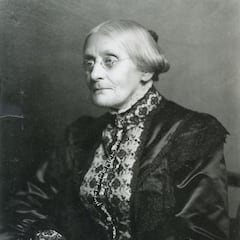The US president who didn’t vote for himself and ended up winning the election
Every 4 years US presidential contenders make a point of being photographed voting, for themselves no doubt. But have any not cast a ballot for themselves?

The 2024 US presidential election is coming to a close, well at least the casting of ballots by US citizens. Like every election cycle, US presidential contenders make a point of being photographed voting, for themselves no doubt.
Follow AS’s live coverage of Election Day and the count in swing states
- Pennsylvania US Election Results 2024 live
- Wisconsin US Election Results 2024 live
- Georgia US Election Results 2024 live
- Nevada US Election Results 2024 live
- Michigan US Election Results 2024 live
- North Carolina US Election Results 2024 live
- Arizona US Election Results 2024 live
But there was a time when candidates didn’t do whirlwind tours across the country to garner the support of the American populous, but then again not everyone could vote. Generally, in the elections before 1860, only white men with property were allowed to vote and they were the only candidates as well.
The US president who didn’t vote for himself and ended up winning the election
While we cannot be sure of whether or not he voted for himself what we do know about George Washington is that he was reluctant to become president. He didn’t even put his name up for nomination and people weren’t sure if he would even accept the position if elected.
The fledgling nation had come out of a bruising War of Independence and the general that had led the Continental Army to victory just want to retire to his estate at Mount Vernon, Virginia. However, the newly formed nation “needed a strong and effective leader,” and many felt that Washington was just the man for the job.
On this day in 1783, George Washington bids farewell to the soldiers of the disbanded Continental Army. "The unparalleled perseverance of the army through almost every possible suffering and discouragement for the space of eight long years was little short of a standing miracle” pic.twitter.com/mRjVka9DGL
— Military History Now (@MilHistNow) November 3, 2024
So much so that the “vote” for the hero of the War of Independence was unanimous when all 69 state electors met on April 6, 1789. Some of the states had chosen their electors through a popular vote and others appointed theirs through state legislatures.
Secretary of Congress Charles Thomson traveled to Mount Vernon to deliver the news “to indulge the hope, that so auspicious a mark of public confidence will meet your approbation, and be considered as a sure pledge of the affection and support you are to expect from a free and an enlightened people.”
“I have been long accustomed to entertain so great a respect for the opinion of my fellow-citizens, that the knowledge of their unanimous suffrages having been given in my favor, scarcely leaves me... an option,” Washington responded.
“Whatever may have been my private feelings and sentiments, I believe I cannot give a greater evidence of my sensibility for the honor they have done me, than by accepting the appointment... All I can promise is, only that which can be accomplished by an honest zeal,” he added.
Related stories

Voting pioneer Susan B. Anthony's story

Who are the presidents of Mount Rushmore?
George Washington would go on to be re-elected in 1792, beginning the four-year cycle of elections that has continued to this day, again by a unanimous vote. He is the only US president who has won the Electoral College by a unanimous vote.
" ... sooner or later the chief of some prevailing faction, more able or more fortunate than his competitors, turns this disposition to the purposes of his own elevation, on the ruins of public liberty." President George Washington's farwell address. https://t.co/02VCipJjhn pic.twitter.com/VnXNEVnSqJ
— Beinecke Library (@BeineckeLibrary) September 19, 2018
At the end of his second term, he chose to retire from politics and not seek a third term even though he wasn’t required to leave office. It wouldn’t be until 1951 under the Twenty-second Amendment that presidents would be limited to two terms in office.
